-
AuthorSearch Results
-
February 9, 2022 at 7:00 pm #6276
In reply to: The Elusive Samuel Housley and Other Family Stories
Ellastone and Mayfield
Malkins and Woodwards
Parish RegistersJane Woodward
It’s exciting, as well as enormously frustrating, to see so many Woodward’s in the Ellastone parish registers, and even more so because they go back so far. There are parish registers surviving from the 1500’s: in one, dated 1579, the death of Thomas Woodward was recorded. His father’s name was Humfrey.Jane Woodward married Rowland Malkin in 1751, in Thorpe, Ashbourne. Jane was from Mathfield (also known as Mayfield), Ellastone, on the Staffordshire side of the river Dove. Rowland was from Clifton, Ashbourne, on the Derbyshire side of the river. They were neighbouring villages, but in different counties.
Jane Woodward was born in 1726 according to the marriage transcription. No record of the baptism can be found for her, despite there having been at least four other Woodward couples in Ellastone and Mayfield baptizing babies in the 1720’s and 1730’s. Without finding out the baptism with her parents names on the parish register, it’s impossible to know which is the correct line to follow back to the earlier records.
I found a Mayfield history group on Facebook and asked if there were parish records existing that were not yet online. A member responded that she had a set on microfiche and had looked through the relevant years and didn’t see a Jane Woodward, but she did say that some of the pages were illegible.
The Ellasone parish records from the 1500s surviving at all, considering the events in 1673, is remarkable. To be so close, but for one indecipherable page from the 1700s, to tracing the family back to the 1500s! The search for the connecting link to the earlier records continues.
Some key events in the history of parish registers from familysearch:
In medieval times there were no parish registers. For some years before the Reformation, monastic houses (especially the smaller ones) the parish priest had been developing the custom of noting in an album or on the margins of the service books, the births and deaths of the leading local families.
1538 – Through the efforts of Thomas Cromwell a mandate was issued by Henry VIII to keep parish registers. This order that every parson, vicar or curate was to enter in a book every wedding, christening and burial in his parish. The parish was to provide a sure coffer with two locks, the parson having the custody of one key, the wardens the others. The entries were to be made each Sunday after the service in the presence of one of the wardens.
1642-60 – During the Civil War registers were neglected and Bishop Transcripts were not required.
1650 – In the restoration of Charles they went back to the church to keep christenings, marriages and burial. The civil records that were kept were filed in with the parish in their registers. it is quite usual to find entries explaining the situation during the Interregnum. One rector stated that on 23 April 1643 “Our church was defaced our font thrown down and new forms of prayer appointed”. Another minister not quite so bold wrote “When the war, more than a civil war was raging most grimly between royalists and parliamentarians throughout the greatest part of England, I lived well because I lay low”.
1653 – Cromwell, whose army had defeated the Royalists, was made Lord Protector and acted as king. He was a Puritan. The parish church of England was disorganized, many ministers fled for their lives, some were able to hide their registers and other registers were destroyed. Cromwell ruled that there would be no one religion in England all religions could be practiced. The government took away from the ministers not only the custody of the registers, but even the solemnization of the marriage ceremony. The marriage ceremony was entrusted to the justices to form a new Parish Register (not Registrar) elected by all the ratepayers in a parish, and sworn before and approved by a magistrate.. Parish clerks of the church were made a civil parish clerk and they recorded deaths, births and marriages in the civil parishes.Ellastone:
“Ellastone features as ‘Hayslope’ in George Eliot’s Adam Bede, published in 1859. It earned this recognition because the author’s father spent the early part of his life in the village working as a carpenter.”
Adam Bede Cottage, Ellastone:
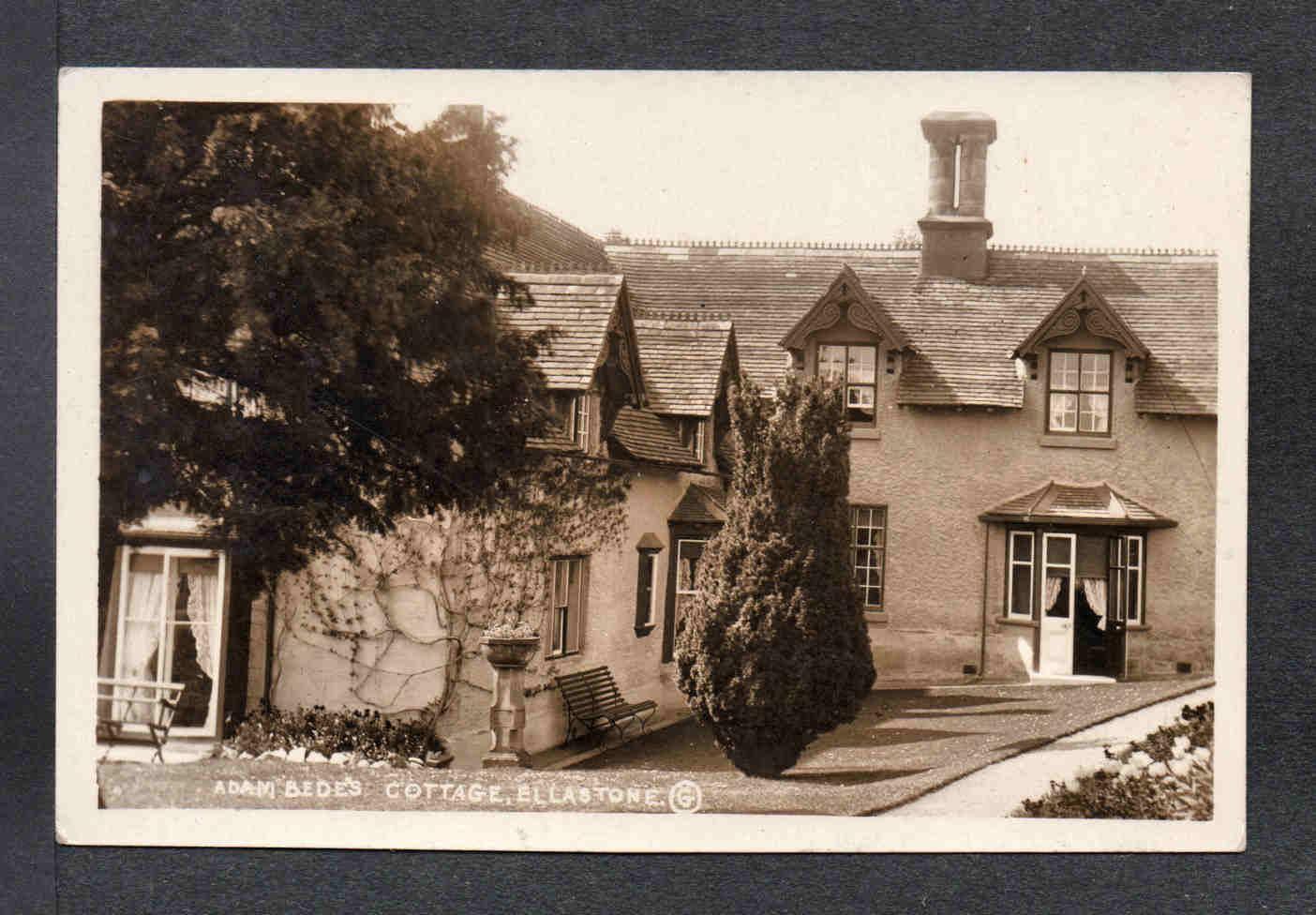
“It was at Ellastone that Robert Evans, George Eliot’s father, passed his early years and worked as a carpenter with his brother Samuel; and it was partly from reminiscences of her father’s talk and from her uncle Samuel’s wife’s preaching experiences that the author constructed the very powerful and moving story of Adam Bede.”
Mary Malkin
1765-1838
Ellen Carrington’s mother was Mary Malkin.
Ellastone:
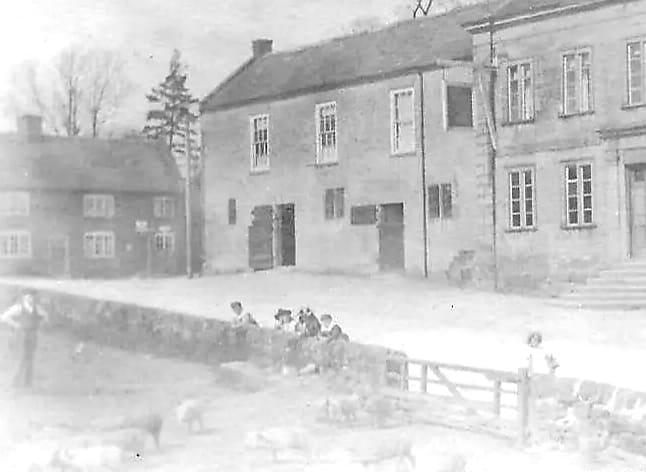
Ashbourn the 31st day of May in the year of our Lord 1751. The marriage of Rowland Malkin and Jane Woodward:
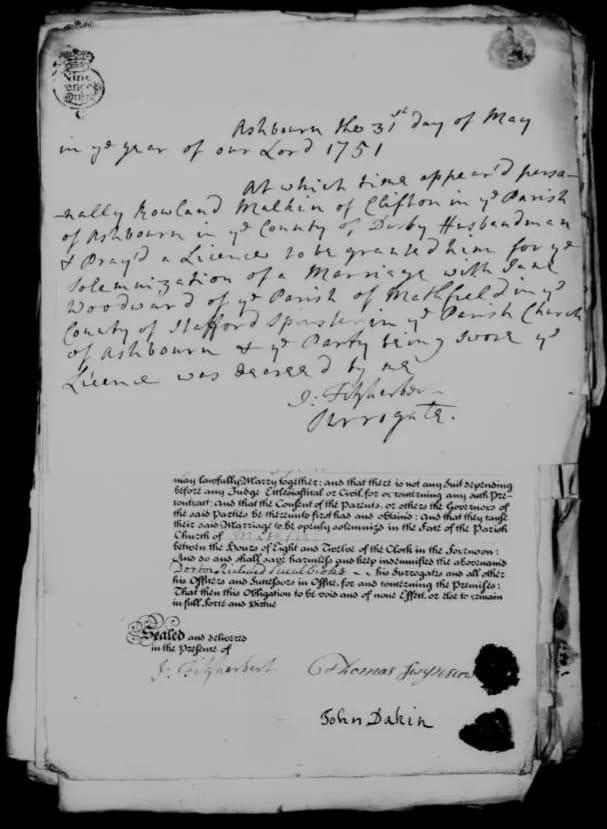 January 23, 2022 at 6:59 pm #6258
January 23, 2022 at 6:59 pm #6258In reply to: The Elusive Samuel Housley and Other Family Stories
The Buxton Marshalls
and the DNA Match
Several years before I started researching the family tree, a friend treated me to a DNA test just for fun. The ethnicity estimates were surprising (and still don’t make much sense): I am apparently 58% Scandinavian, 37% English, and a little Iberian, North African, and even a bit Nigerian! My ancestry according to genealogical research is almost 100% Midlands English for the past three hundred years.
Not long after doing the DNA test, I was contacted via the website by Jim Perkins, who had noticed my Marshall name on the DNA match. Jim’s grandfather was James Marshall, my great grandfather William Marshall’s brother. Jim told me he had done his family tree years before the advent of online genealogy. Jim didn’t have a photo of James, but we had several photos with “William Marshall’s brother” written on the back.
Jim sent me a photo of his uncle, the man he was named after. The photo shows Charles James Marshall in his army uniform. He escaped Dunkirk in 1940 by swimming out to a destroyer, apparently an excellent swimmer. Sadly he was killed, aged 25 and unmarried, on Sep 2 1942 at the Battle of Alma-Halfa in North Africa. Jim was born exactly one year later.
Jim and I became friends on Facebook. In 2021 a relative kindly informed me that Jim had died. I’ve since been in contact with his sister Marilyn. Jim’s grandfather James Marshall was the eldest of John and Emma’s children, born in 1873. James daughter with his first wife Martha, Hilda, married James Perkins, Jim and Marilyn’s parents. Charles James Marshall who died in North Africa was James son by a second marriage. James was a railway engine fireman on the 1911 census, and a retired rail driver on the 1939 census.
Charles James Marshall 1917-1942 died at the Battle of Alma-Halfa in North Africa:
photo thanks to Jim Perkins
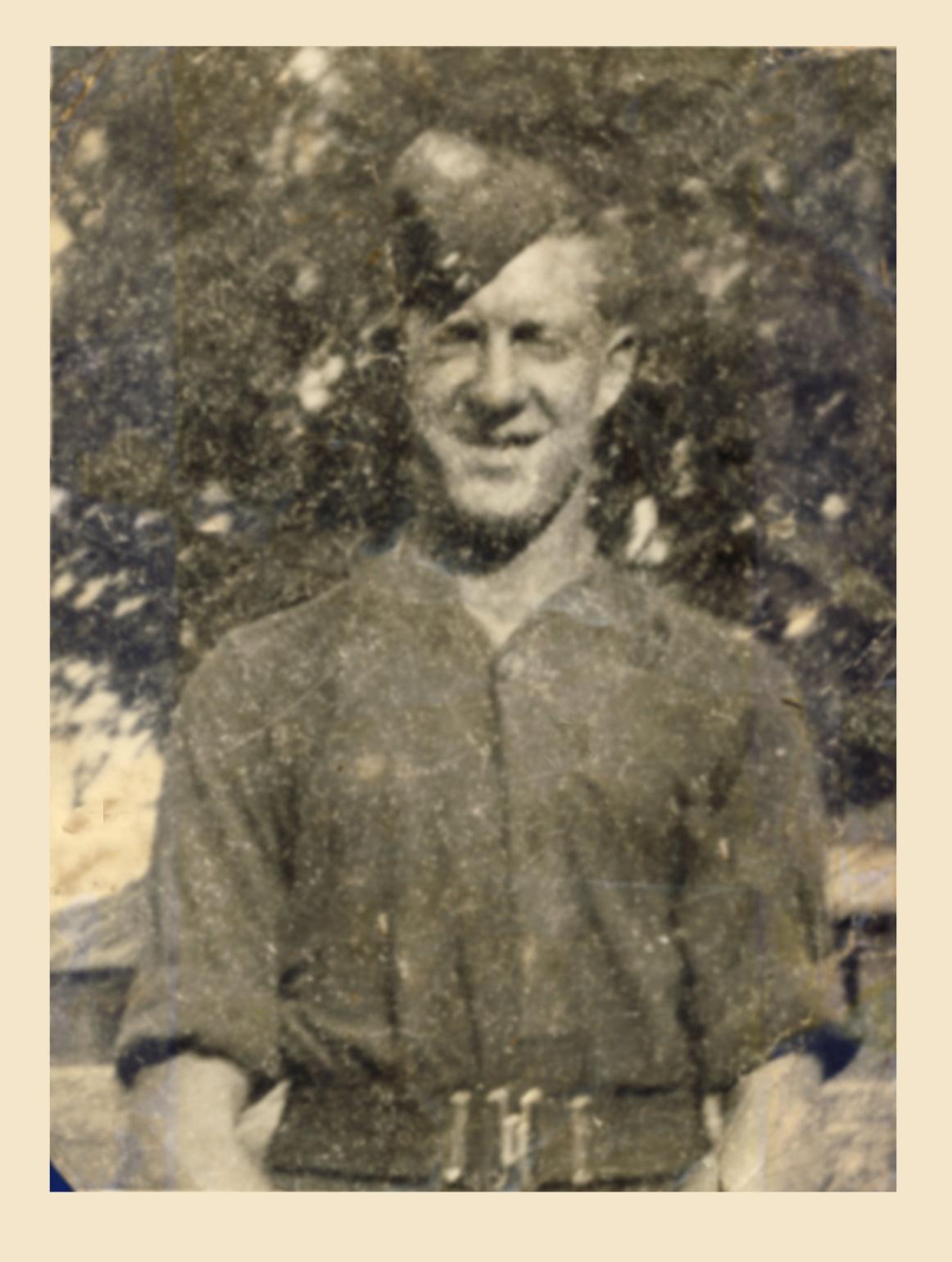
Anna Marshall, born in 1875, was a dressmaker and never married. She was still living with her parents John and Emma in Buxton on the 1921 census. One the 1939 census she was still single at the age of 66, and was living with John J Marshall born 1916. Perhaps a nephew?
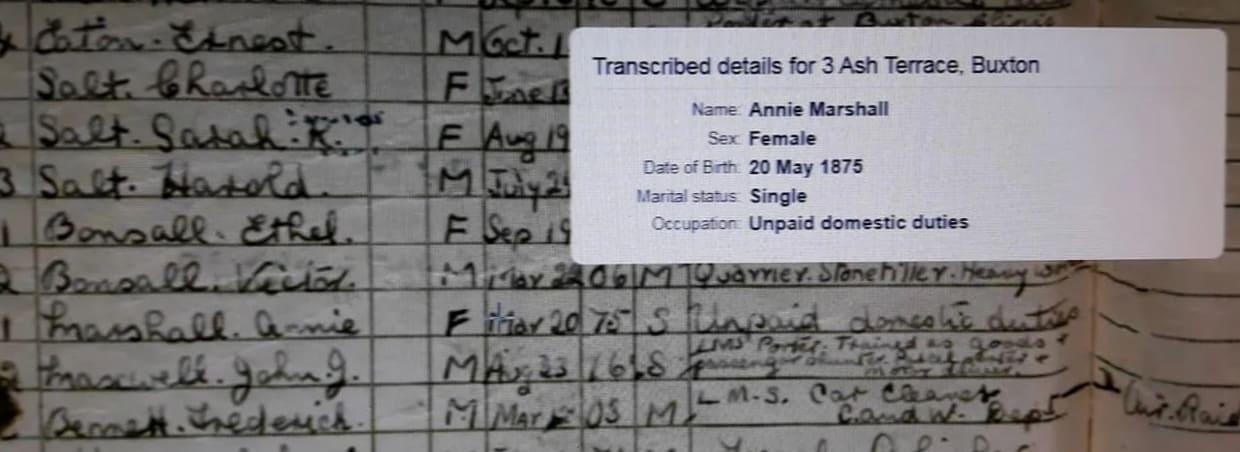
John Marshall was born in 1877. Buxton is a spa town with many hotels, and John was the 2nd porter living in at the Crescent Hotel on the 1901 census, although he married later that year. In the 1911 census John was married with three children and living in Fairfield, Buxton, and his occupation was Hotel Porter and Boots. John and Alice had four children, although one son died in infancy, leaving two sons and a daughter, Lily.
My great grandfather William Marshall was born in 1878, and Edward Marshall was born in 1880. According to the family stories, one of William’s brothers was chief of police in Lincolnshire, and two of the family photos say on the back “Frank Marshall, chief of police Lincolnshire”. But it wasn’t Frank, it was Edward, and it wasn’t Lincolnshire, it was Lancashire.
The records show that Edward Marshall was a hotel porter at the Pulteney Hotel in Bath, Somerset, in 1901. Presumably he started working in hotels in Buxton prior to that. James married Florence in Bath in 1903, and their first four children were born in Bath. By 1911 the family were living in Salmesbury, near Blackburn Lancashire, and Edward was a police constable. On the 1939 census, James was a retired police inspector, still living in Lancashire. Florence and Edward had eight children.
It became clear that the two photographs we have that were labeled “Frank Marshall Chief of police” were in fact Edward, when I noticed that both photos were taken by a photographer in Bath. They were correctly labeled as the policeman, but we had the name wrong.
Edward and Florence Marshall, Bath, Somerset:
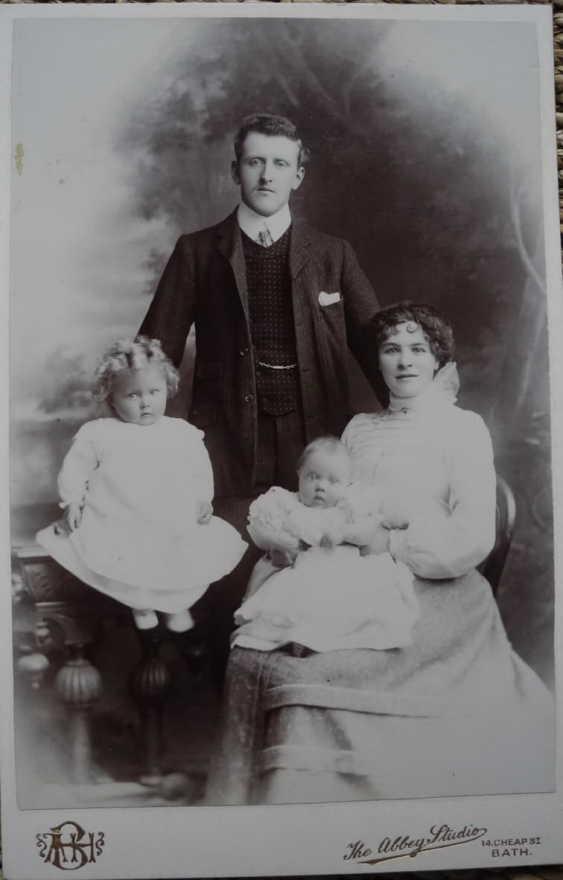
Sarah Marshall was born in 1882 and died two years later.
Nellie Marshall was born in 1885 and I have not yet found a marriage or death for her.
Harry Marshall was John and Emma’s next child, born in 1887. On the 1911 census Harry is 24 years old, and lives at home with his parents and sister Ann. His occupation is a barman in a hotel. I haven’t yet found any further records for Harry.
Frank Marshall was the youngest, born in 1889. In 1911 Frank was living at the George Hotel in Buxton, employed as a boot boy. Also listed as live in staff at the hotel was Lily Moss, a kitchenmaid.

In 1913 Frank and Lily were married, and in 1914 their first child Millicent Rose was born. On the 1921 census Frank, Lily, William Rose and one other (presumably Millicent Rose) were living in Hartington Upper Quarter, Buxton.
The George Hotel, Buxton:
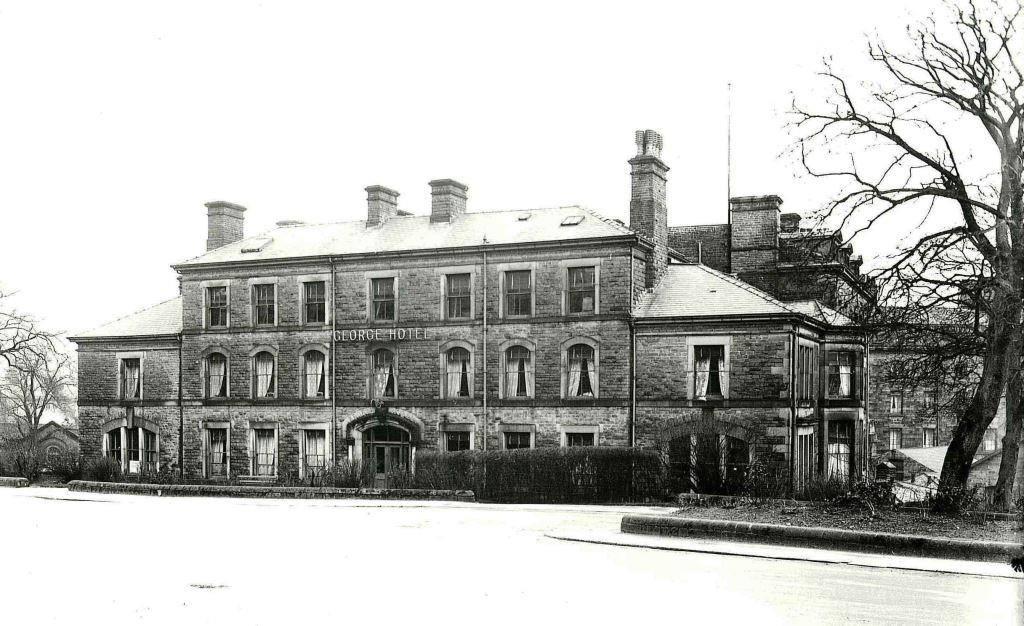
One of the photos says on the back “Jack Marshall, brother of William Marshall, WW1”:
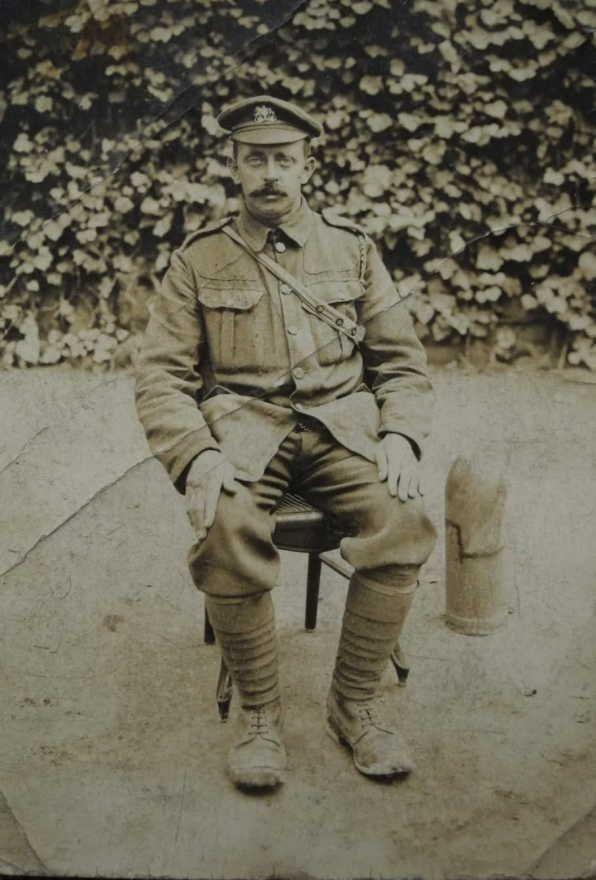
Another photo that says on the back “William Marshalls brother”:
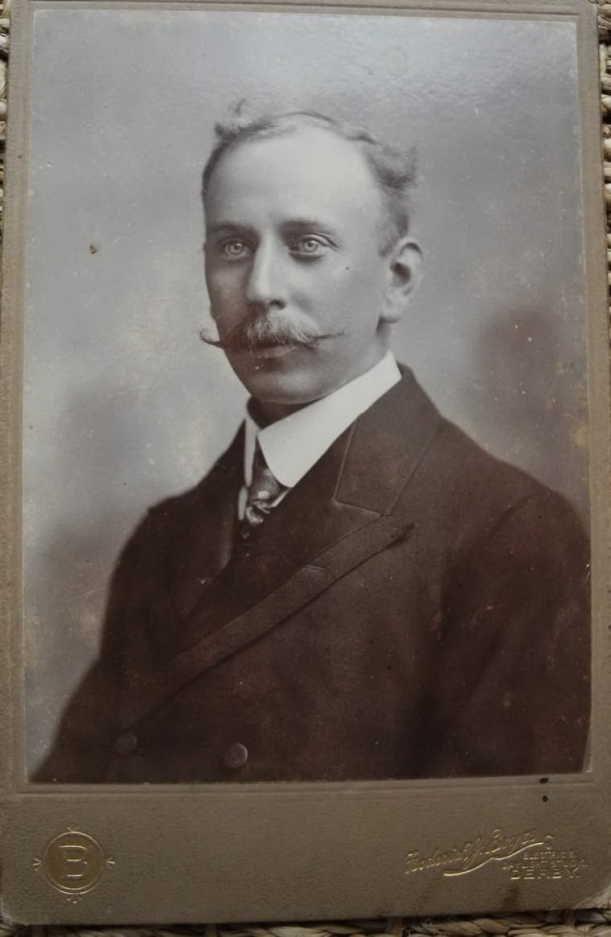
Another “William Marshalls brother”:
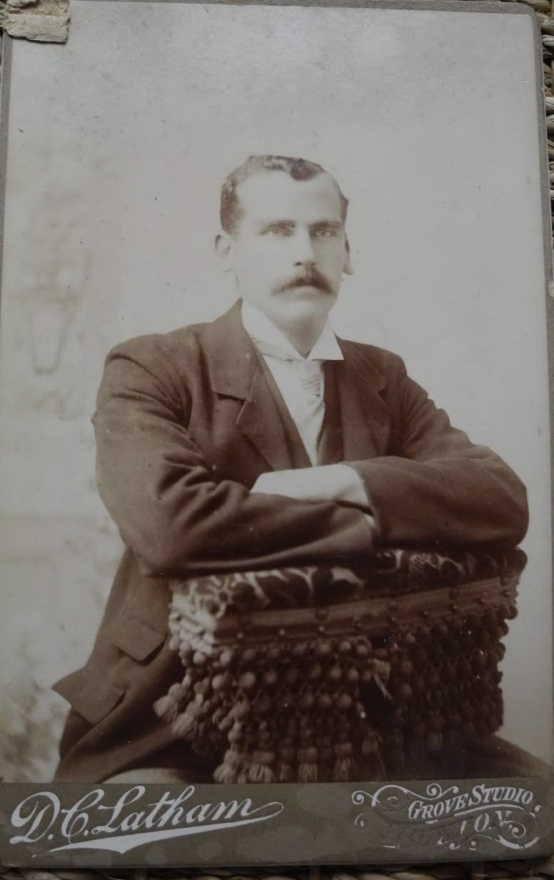
And another “William Marshalls brother”:
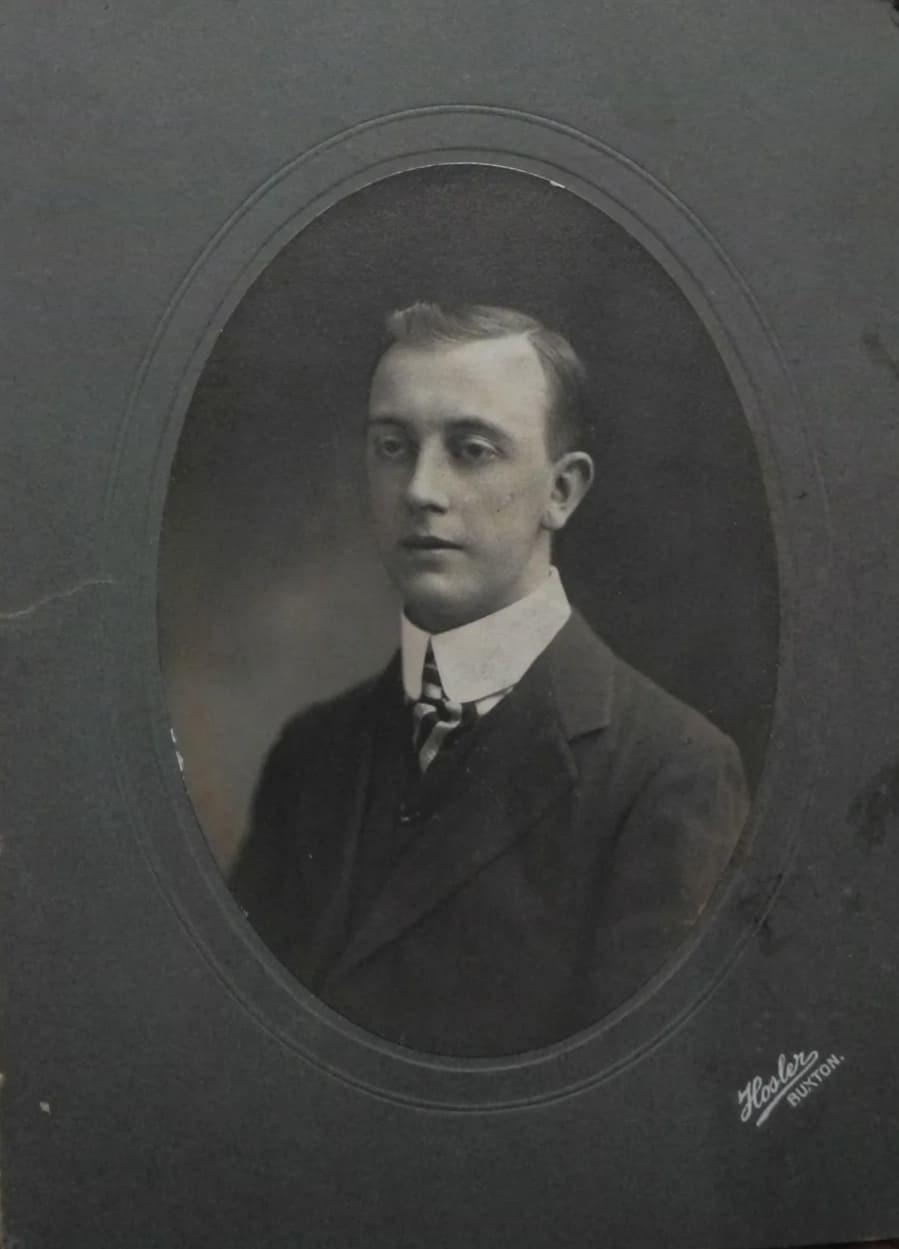
Unlabeled but clearly a Marshall:
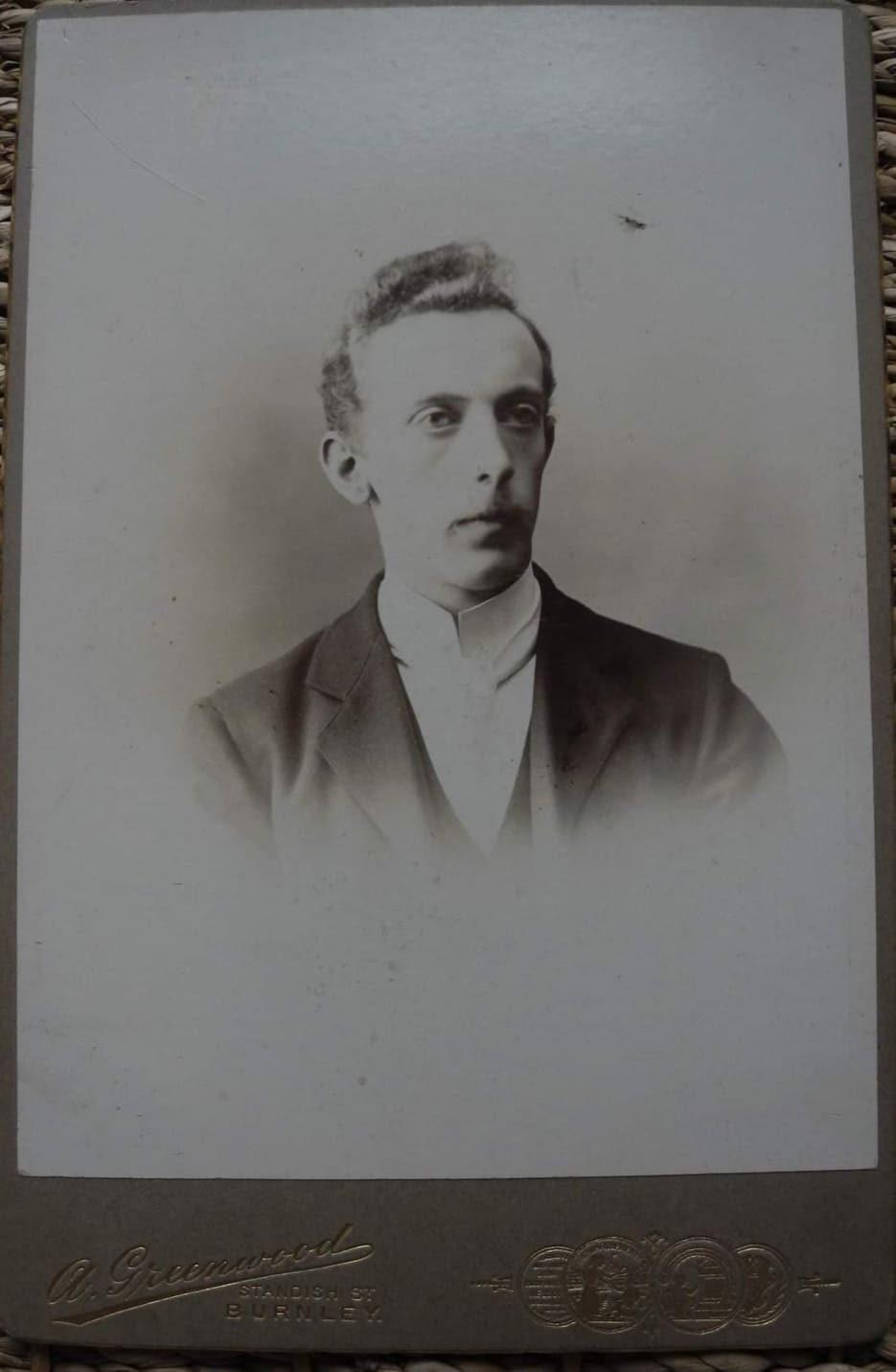
The last photo is clearly a Marshall, but I haven’t yet found a Burnley connection with any of the Marshall brothers.
January 20, 2022 at 9:16 am #6255In reply to: The Elusive Samuel Housley and Other Family Stories
My Grandparents
George Samuel Marshall 1903-1995
Florence Noreen Warren (Nora) 1906-1988
I always called my grandfather Mop, apparently because I couldn’t say the name Grandpa, but whatever the reason, the name stuck. My younger brother also called him Mop, but our two cousins did not.
My earliest memories of my grandparents are the picnics. Grandma and Mop loved going out in the car for a picnic. Favourite spots were the Clee Hills in Shropshire, North Wales, especially Llanbedr, Malvern, and Derbyshire, and closer to home, the caves and silver birch woods at Kinver Edge, Arley by the river Severn, or Bridgnorth, where Grandma’s sister Hildreds family lived. Stourbridge was on the western edge of the Black Country in the Midlands, so one was quickly in the countryside heading west. They went north to Derbyshire less, simply because the first part of the trip entailed driving through Wolverhampton and other built up and not particularly pleasant urban areas. I’m sure they’d have gone there more often, as they were both born in Derbyshire, if not for that initial stage of the journey.
There was predominantly grey tartan car rug in the car for picnics, and a couple of folding chairs. There were always a couple of cushions on the back seat, and I fell asleep in the back more times than I can remember, despite intending to look at the scenery. On the way home Grandma would always sing, “Show me the way to go home, I’m tired and I want to go to bed, I had a little drink about an hour ago, And it’s gone right to my head.” I’ve looked online for that song, and have not found it anywhere!
Grandma didn’t just make sandwiches for picnics, there were extra containers of lettuce, tomatoes, pickles and so on. I used to love to wash up the picnic plates in the little brook on the Clee Hills, near Cleeton St Mary. The close cropped grass was ideal for picnics, and Mop and the sheep would Baaa at each other.
Mop would base the days outting on the weather forcast, but Grandma often used to say he always chose the opposite of what was suggested. She said if you want to go to Derbyshire, tell him you want to go to Wales. I recall him often saying, on a gloomy day, Look, there’s a bit of clear sky over there. Mop always did the driving as Grandma never learned to drive. Often she’d dust the dashboard with a tissue as we drove along.
My brother and I often spent the weekend at our grandparents house, so that our parents could go out on a Saturday night. They gave us 5 shillings pocket money, which I used to spend on two Ladybird books at 2 shillings and sixpence each. We had far too many sweets while watching telly in the evening ~ in the dark, as they always turned the lights off to watch television. The lemonade and pop was Corona, and came in returnable glass bottles. We had Woodpecker cider too, even though it had a bit of an alcohol content.
Mop smoked Kensitas and Grandma smoked Sovereign cigarettes, or No6, and the packets came with coupons. They often let me choose something for myself out of the catalogue when there were enough coupons saved up.
When I had my first garden, in a rented house a short walk from theirs, they took me to garden nurseries and taught me all about gardening. In their garden they had berberis across the front of the house under the window, and cotoneaster all along the side of the garage wall. The silver birth tree on the lawn had been purloined as a sapling from Kinver edge, when they first moved into the house. (they lived in that house on Park Road for more than 60 years). There were perennials and flowering shrubs along the sides of the back garden, and behind the silver birch, and behind that was the vegeatable garden. Right at the back was an Anderson shelter turned into a shed, the rhubarb, and the washing line, and the canes for the runner beans in front of those. There was a little rose covered arch on the path on the left, and privet hedges all around the perimeter.
My grandfather was a dental technician. He worked for various dentists on their premises over the years, but he always had a little workshop of his own at the back of his garage. His garage was full to the brim of anything that might potentially useful, but it was not chaotic. He knew exactly where to find anything, from the tiniest screw for spectacles to a useful bit of wire. He was “mechanicaly minded” and could always fix things like sewing machines and cars and so on.
Mop used to let me sit with him in his workshop, and make things out of the pink wax he used for gums to embed the false teeth into prior to making the plaster casts. The porcelain teeth came on cards, and were strung in place by means of little holes on the back end of the teeth. I still have a necklace I made by threading teeth onto a string. There was a foot pedal operated drill in there as well, possibly it was a dentists drill previously, that he used with miniature grinding or polishing attachments. Sometimes I made things out of the pink acrylic used for the final denture, which had a strong smell and used to harden quickly, so you had to work fast. Initially, the workshop was to do the work for Uncle Ralph, Grandmas’s sisters husband, who was a dentist. In later years after Ralph retired, I recall a nice man called Claude used to come in the evening to collect the dentures for another dental laboratory. Mop always called his place of work the laboratory.
Grandma loved books and was always reading, in her armchair next to the gas fire. I don’t recall seeing Mop reading a book, but he was amazingly well informed about countless topics.
At family gatherings, Mops favourite topic of conversation after dinner was the atrocities committed over the centuries by organized religion.My grandfather played snooker in his younger years at the Conservative club. I recall my father assuming he voted Conservative, and Mop told him in no uncertain terms that he’s always voted Labour. When asked why he played snooker at the Conservative club and not the Labour club, he said with a grin that “it was a better class of people”, but that he’d never vote Conservative because it was of no benefit to the likes of us working people.
Grandma and her sister in law Marie had a little grocers shop on Brettel Lane in Amblecote for a few years but I have no personal recollection of that as it was during the years we lived in USA. I don’t recall her working other than that. She had a pastry making day once a week, and made Bakewell tart, apple pie, a meat pie, and her own style of pizza. She had an old black hand operated sewing machine, and made curtains and loose covers for the chairs and sofa, but I don’t think she made her own clothes, at least not in later years. I have her sewing machine here in Spain.
At regular intervals she’d move all the furniture around and change the front room into the living room and the back into the dining room and vice versa. In later years Mop always had the back bedroom (although when I lived with them aged 14, I had the back bedroom, and painted the entire room including the ceiling purple). He had a very lumpy mattress but he said it fit his bad hip perfectly.Grandma used to alternate between the tiny bedroom and the big bedroom at the front. (this is in later years, obviously) The wardrobes and chests of drawers never changed, they were oak and substantial, but rather dated in appearance. They had a grandfather clock with a brass face and a grandmother clock. Over the fireplace in the living room was a Utrillo print. The bathroom and lavatory were separate rooms, and the old claw foot bath had wood panels around it to make it look more modern. There was a big hot water geyser above it. Grandma was fond of using stick on Fablon tile effects to try to improve and update the appearance of the bathroom and kitchen. Mop was a generous man, but would not replace household items that continued to function perfectly well. There were electric heaters in all the rooms, of varying designs, and gas fires in living room and dining room. The coal house on the outside wall was later turned into a downstairs shower room, when Mop moved his bedroom downstairs into the front dining room, after Grandma had died and he was getting on.

Mop was 91 when he told me he wouldn’t be growing any vegetables that year. He said the sad thing was that he knew he’d never grow vegetables again. He worked part time until he was in his early 80s.
December 25, 2021 at 10:47 am #6248In reply to: The Elusive Samuel Housley and Other Family Stories
Bakewell Not Eyam
The Elton Marshalls
Some years ago I read a book about Eyam, the Derbyshire village devastated by the plague in 1665, and about how the villagers quarantined themselves to prevent further spread. It was quite a story. Each year on ‘Plague Sunday’, at the end of August, residents of Eyam mark the bubonic plague epidemic that devastated their small rural community in the years 1665–6. They wear the traditional costume of the day and attend a memorial service to remember how half the village sacrificed themselves to avoid spreading the disease further.
My 4X great grandfather James Marshall married Ann Newton in 1792 in Elton. On a number of other people’s trees on an online ancestry site, Ann Newton was from Eyam. Wouldn’t that have been interesting, to find ancestors from Eyam, perhaps going back to the days of the plague. Perhaps that is what the people who put Ann Newton’s birthplace as Eyam thought, without a proper look at the records.
But I didn’t think Ann Newton was from Eyam. I found she was from Over Haddon, near Bakewell ~ much closer to Elton than Eyam. On the marriage register, it says that James was from Elton parish, and she was from Darley parish. Her birth in 1770 says Bakewell, which was the registration district for the villages of Over Haddon and Darley. Her parents were George Newton and Dorothy Wipperley of Over Haddon,which is incidentally very near to Nether Haddon, and Haddon Hall. I visited Haddon Hall many years ago, as well as Chatsworth (and much preferred Haddon Hall).
I looked in the Eyam registers for Ann Newton, and found a couple of them around the time frame, but the men they married were not James Marshall.
Ann died in 1806 in Elton (a small village just outside Matlock) at the age of 36 within days of her newborn twins, Ann and James. James and Ann had two sets of twins. John and Mary were twins as well, but Mary died in 1799 at the age of three.
1796 baptism of twins John and Mary of James and Ann Marshall

Ann’s husband James died 42 years later at the age of eighty, in Elton in 1848. It was noted in the parish register that he was for years parish clerk.

On the 1851 census John Marshall born in 1796, the son of James Marshall the parish clerk, was a lead miner occupying six acres in Elton, Derbyshire.
His son, also John, was registered on the census as a lead miner at just eight years old.
The mining of lead was the most important industry in the Peak district of Derbyshire from Roman times until the 19th century – with only agriculture being more important for the livelihood of local people. The height of lead mining in Derbyshire came in the 17th and 18th centuries, and the evidence is still visible today – most obviously in the form of lines of hillocks from the more than 25,000 mineshafts which once existed.
Peak District Mines Historical Society
Smelting, or extracting the lead from the ore by melting it, was carried out in a small open hearth. Lead was cast in layers as each batch of ore was smelted; the blocks of lead thus produced were referred to as “pigs”. Examples of early smelting-hearths found within the county were stone lined, with one side open facing the prevailing wind to create the draught needed. The hilltops of the Matlocks would have provided very suitable conditions.
The miner used a tool called a mattock or a pick, and hammers and iron wedges in harder veins, to loosen the ore. They threw the ore onto ridges on each side of the vein, going deeper where the ore proved richer.
Many mines were very shallow and, once opened, proved too poor to develop. Benjamin Bryan cited the example of “Ember Hill, on the shoulder of Masson, above Matlock Bath” where there are hollows in the surface showing where there had been fruitless searches for lead.
There were small buildings, called “coes”, near each mine shaft which were used for tool storage, to provide shelter and as places for changing into working clothes. It was here that the lead was smelted and stored until ready for sale.
Lead is, of course, very poisonous. As miners washed lead-bearing material, great care was taken with the washing vats, which had to be covered. If cattle accidentally drank the poisoned water they would die from something called “belland”.
Cornish and Welsh miners introduced the practice of buddling for ore into Derbyshire about 1747. Buddling involved washing the heaps of rubbish in the slag heaps, the process of separating the very small particles from the dirt and spar with which they are mixed, by means of a small stream of water. This method of extraction was a major pollutant, affecting farmers and their animals (poisoned by Belland from drinking the waste water), the brooks and streams and even the River Derwent.
Women also worked in the mines. An unattributed account from 1829, says: “The head is much enwrapped, and the features nearly hidden in a muffling of handkerchiefs, over which is put a man’s hat, in the manner of the paysannes of Wales”. He also describes their gowns, usually red, as being “tucked up round the waist in a sort of bag, and set off by a bright green petticoat”. They also wore a man’s grey or dark blue coat and shoes with 3″ thick soles that were tied round with cords. The 1829 writer called them “complete harridans!”
Lead Mining in Matlock & Matlock Bath, The Andrews Pages
John’s wife Margaret died at the age of 42 in 1847. I don’t know the cause of death, but perhaps it was lead poisoning. John’s son John, despite a very early start in the lead mine, became a carter and lived to the ripe old age of 88.
The Pig of Lead pub, 1904:

The earliest Marshall I’ve found so far is Charles, born in 1742. Charles married Rebecca Knowles, 1775-1823. I don’t know what his occupation was but when he died in 1819 he left a not inconsiderable sum to his wife.
1819 Charles Marshall probate:

There are still Marshall’s living in Elton and Matlock, not our immediate known family, but probably distantly related. I asked a Matlock group on facebook:
“…there are Marshall’s still in the village. There are certainly families who live here who have done generation after generation & have many memories & stories to tell. Visit The Duke on a Friday night…”
The Duke, Elton:
 December 18, 2021 at 7:05 pm #6246
December 18, 2021 at 7:05 pm #6246In reply to: The Elusive Samuel Housley and Other Family Stories
Florence Nightingale Gretton
1881-1927
Florence’s father was Richard Gretton, a baker in Swadlincote, Derbyshire. When Richard married Sarah Orgill in 1861, they lived with her mother, a widow, in Measham, Ashby de la Zouch in Leicestershire. On the 1861 census Sarah’s mother, Elizabeth, is a farmer of two acres.
(Swadlincote and Ashby de la Zouch are on the Derbyshire Leicestershire border and not far from each other. Swadlincote is near to Burton upon Trent which is sometimes in Staffordshire, sometimes in Derbyshire. Newhall, Church Gresley, and Swadlincote are all very close to each other or districts in the same town.)
Ten years later in 1871 Richard and Sarah have their own place in Swadlincote, he is a baker, and they have four children. A fourteen year old apprentice or servant is living with them.
In the Ashby-de-la-Zouch Gazette on 28 February 1880, it was reported that Richard Gretton, baker, of Swadlincote, was charged by Captain Bandys with carrying bread in a cart for sale, the said cart not being provided with scales and weights, according to the requirements of the Act, on the 17th January last.—Defendant pleaded guilty, but urged in extenuation of the offence that in the hurry he had forgotten to put the scales in the cart before his son started.—The Bench took this view of the case, regarding it as an oversight, and fined him one shilling only and costs. This was not his only offence.
In 1883, he was fined twenty shillings, and ten shillings and sixpence costs.

By 1881 they have 4 more children, and Florence Nightingale is the youngest at four months. Richard is 48 by now, and Sarah is 44. Florence’s older brother William is a blacksmith.
Interestingly on the same census page, two doors down Thomas and Selina Warren live at the Stanhope Arms. Richards son John Gretton lives at the pub, a 13 year old servant. Incidentally, I noticed on Thomas and Selena’s marriage register that Richard and Sarah Gretton were the witnesses at the wedding.
Ten years later in 1891, Florence Nightingale and her sister Clara are living with Selina Warren, widow, retired innkeeper, one door down from the Stanhope Arms. Florence is ten, Clara twelve and they are scholars.
Richard and Sarah are still living three doors up on the other side of the Stanhope Arms, with three of their sons. But the two girls lived up the road with the Warren widow!The Stanhope Arms, Swadlincote: it’s possible that the shop with the awning was Richard Gretton’s bakers shop (although not at the time of this later photo).

Richard died in 1898, a year before Florence married Samuel Warren.
Sarah is a widowed 60 year old baker on the 1901 census. Her son 26 year old son Alf, also a baker, lives at the same address, as does her 22 year old daughter Clara who is a district nurse.
Clara Gretton and family, photo found online:

In 1901 Florence Nightingale (who we don’t have a photograph of!) is now married and is Florrie Warren on the census, and she, her husband Samuel, and their one year old daughter Hildred are visitors at the address of Elizabeth (Staley)Warren, 60 year old widow and Samuel’s mother, and Samuel’s 36 year old brother William. Samuel and William are engineers.
Samuel and Florrie had ten children between 1900 and 1925 (and all but two of them used their middle name and not first name: my mother and I had no idea until I found all the records. My grandmother Florence Noreen was known as Nora, which we knew of course, uncle Jack was actually Douglas John, and so on).
Hildred, Clara, Billy, and Nora were born in Swadlincote. Sometime between my grandmother’s birth in 1907 and Kay’s birth in 1911, the family moved to Oldswinford, in Stourbridge. Later they moved to Market Street.
1911 census, Oldswinford, Stourbridge:

Oddly, nobody knew when Florrie Warren died. My mothers cousin Ian Warren researched the Warren family some years ago, while my grandmother was still alive. She contributed family stories and information, but couldn’t remember if her mother died in 1929 or 1927. A recent search of records confirmed that it was the 12th November 1927.
She was 46 years old. We were curious to know how she died, so my mother ordered a paper copy of her death certificate. It said she died at 31 Market Street, Stourbridge at the age of 47. Clara May Warren, her daughter, was in attendance. Her husband Samuel Warren was a motor mechanic. The Post mortem was by Percival Evans, coroner for Worcestershire, who clarified the cause of death as vascular disease of the heart. There was no inquest. The death was registered on 15 Nov 1927.
I looked for a photo of 31 Market Street in Stourbridge, and was astonished to see that it was the house next door to one I lived in breifly in the 1980s. We didn’t know that the Warren’s lived in Market Street until we started searching the records.
Market Street, Stourbridge. I lived in the one on the corner on the far right, my great grandmother died in the one next door.

I found some hitherto unknown emigrants in the family. Florence Nightingale Grettons eldest brother William 1861-1940 stayed in Swadlincote. John Orgill Gretton born in 1868 moved to Trenton New Jersey USA in 1888, married in 1892 and died in 1949 in USA. Michael Thomas born in 1870 married in New York in 1893 and died in Trenton in 1940. Alfred born 1875 stayed in Swadlincote. Charles Herbert born 1876 married locally and then moved to Australia in 1912, and died in Victoria in 1954. Clara Elizabeth was a district nurse, married locally and died at the age of 99.
December 18, 2021 at 12:59 pm #6243In reply to: The Elusive Samuel Housley and Other Family Stories
William Housley’s Will and the Court Case
William Housley died in 1848, but his widow Ellen didn’t die until 1872. The court case was in 1873. Details about the court case are archived at the National Archives at Kew, in London, but are not available online. They can be viewed in person, but that hasn’t been possible thus far. However, there are a great many references to it in the letters.
William Housley’s first wife was Mary Carrington 1787-1813. They had three children, Mary Anne, Elizabeth and William. When Mary died, William married Mary’s sister Ellen, not in their own parish church at Smalley but in Ashbourne. Although not uncommon for a widower to marry a deceased wife’s sister, it wasn’t legal. This point is mentioned in one of the letters.
One of the pages of William Housley’s will:

An excerpt from Barbara Housley’s Narrative on the Letters:
A comment in a letter from Joseph (August 6, 1873) indicated that William was married twice and that his wives were sisters: “What do you think that I believe that Mary Ann is trying to make our father’s will of no account as she says that my father’s marriage with our mother was not lawful he marrying two sisters. What do you think of her? I have heard my mother say something about paying a fine at the time of the marriage to make it legal.” Markwell and Saul in The A-Z Guide to Tracing Ancestors in Britain explain that marriage to a deceased wife’s sister was not permissible under Canon law as the relationship was within the prohibited degrees. However, such marriages did take place–usually well away from the couple’s home area. Up to 1835 such marriages were not void but were voidable by legal action. Few such actions were instituted but the risk was always there.
Joseph wrote that when Emma was married, Ellen “broke up the comfortable home and the things went to Derby and she went to live with them but Derby didn’t agree with her so she left again leaving her things behind and came to live with John in the new house where she died.” Ellen was listed with John’s household in the 1871 census.
In May 1872, the Ilkeston Pioneer carried this notice: “Mr. Hopkins will sell by auction on Saturday next the eleventh of May 1872 the whole of the useful furniture, sewing machine, etc. nearly new on the premises of the late Mrs. Housley at Smalley near Heanor in the county of Derby. Sale at one o’clock in the afternoon.”There were hard feelings between Mary Ann and Ellen and her children. Anne wrote: “If you remember we were not very friendly when you left. They never came and nothing was too bad for Mary Ann to say of Mother and me, but when Robert died Mother sent for her to the funeral but she did not think well to come so we took no more notice. She would not allow her children to come either.”
Mary Ann was still living in May 1872. Joseph implied that she and her brother, Will “intend making a bit of bother about the settlement of the bit of property” left by their mother. The 1871 census listed Mary Ann’s occupation as “income from houses.”In July 1872, Joseph introduced Ruth’s husband: “No doubt he is a bad lot. He is one of the Heath’s of Stanley Common a miller and he lives at Smalley Mill” (Ruth Heath was Mary Anne Housley’s daughter)
In 1873 Joseph wrote, “He is nothing but a land shark both Heath and his wife and his wife is the worst of the two. You will think these is hard words but they are true dear brother.” The solicitor, Abraham John Flint, was not at all pleased with Heath’s obstruction of the settlement of the estate. He wrote on June 30, 1873: “Heath agreed at first and then because I would not pay his expenses he refused and has since instructed another solicitor for his wife and Mrs. Weston who have been opposing us to the utmost. I am concerned for all parties interested except these two….The judge severely censured Heath for his conduct and wanted to make an order for sale there and then but Heath’s council would not consent….” In June 1875, the solicitor wrote: “Heath bid for the property but it fetched more money than he could give for it. He has been rather quieter lately.”In May 1872, Joseph wrote: “For what do you think, John has sold his share and he has acted very bad since his wife died and at the same time he sold all his furniture. You may guess I have never seen him but once since poor mother’s funeral and he is gone now no one knows where.”
In 1876, the solicitor wrote to George: “Have you heard of John Housley? He is entitled to Robert’s share and I want him to claim it.”
Anne intended that one third of the inheritance coming to her from her father and her grandfather, William Carrington, be divided between her four nieces: Sam’s three daughters and John’s daughter Elizabeth.
In the same letter (December 15, 1872), Joseph wrote:
“I think we have now found all out now that is concerned in the matter for there was only Sam that we did not know his whereabouts but I was informed a week ago that he is dead–died about three years ago in Birmingham Union. Poor Sam. He ought to have come to a better end than that”However, Samuel was still alive was on the 1871 census in Henley in Arden, and no record of his death can be found. Samuel’s brother in law said he was dead: we do not know why he lied, or perhaps the brothers were lying to keep his share, or another possibility is that Samuel himself told his brother in law to tell them that he was dead. I am inclined to think it was the latter.
Excerpts from Barbara Housley’s Narrative on the Letters continued:
Charles went to Australia in 1851, and was last heard from in January 1853. According to the solicitor, who wrote to George on June 3, 1874, Charles had received advances on the settlement of their parent’s estate. “Your promissory note with the two signed by your brother Charles for 20 pounds he received from his father and 20 pounds he received from his mother are now in the possession of the court.”
In December 1872, Joseph wrote: “I’m told that Charles two daughters has wrote to Smalley post office making inquiries about his share….” In January 1876, the solicitor wrote: “Charles Housley’s children have claimed their father’s share.”
In the Adelaide Observer 28 Aug 1875
HOUSLEY – wanted information
as to the Death, Will, or Intestacy, and
Children of Charles Housley, formerly of
Smalley, Derbyshire, England, who died at
Geelong or Creewick Creek Diggings, Victoria
August, 1855. His children will hear of something to their advantage by communicating with
Mr. A J. Flint, solicitor, Derby, England.
June 16,1875.The Diggers & Diggings of Victoria in 1855. Drawn on Stone by S.T. Gill:

The court case:
Kerry v Housley.
Documents: Bill, demurrer.
Plaintiffs: Samuel Kerry and Joseph Housley.
Defendants: William Housley, Joseph Housley (deleted), Edwin Welch Harvey, Eleanor Harvey (deleted), Ernest Harvey infant, William Stafford, Elizabeth Stafford his wife, Mary Ann Housley, George Purdy and Catherine Purdy his wife, Elizabeth Housley, Mary Ann Weston widow and William Heath and Ruth Heath his wife (deleted).
Provincial solicitor employed in Derbyshire.
Date: 1873From the Narrative on the Letters:
The solicitor wrote on May 23, 1874: “Lately I have not written because I was not certain of your address and because I doubted I had much interesting news to tell you.” Later, Joseph wrote concerning the problems settling the estate, “You see dear brother there is only me here on our side and I cannot do much. I wish you were here to help me a bit and if you think of going for another summer trip this turn you might as well run over here.”
In March 1873, Joseph wrote: “You ask me what I think of you coming to England. I think as you have given the trustee power to sign for you I think you could do no good but I should like to see you once again for all that. I can’t say whether there would be anything amiss if you did come as you say it would be throwing good money after bad.”
In September 1872 Joseph wrote; “My wife is anxious to come. I hope it will suit her health for she is not over strong.” Elsewhere Joseph wrote that Harriet was “middling sometimes. She is subject to sick headaches. It knocks her up completely when they come on.” In December 1872 Joseph wrote, “Now dear brother about us coming to America you know we shall have to wait until this affair is settled and if it is not settled and thrown into Chancery I’m afraid we shall have to stay in England for I shall never be able to save money enough to bring me out and my family but I hope of better things.”
On July 19, 1875 Abraham Flint (the solicitor) wrote: “Joseph Housley has removed from Smalley and is working on some new foundry buildings at Little Chester near Derby. He lives at a village called Little Eaton near Derby. If you address your letter to him as Joseph Housley, carpenter, Little Eaton near Derby that will no doubt find him.”In his last letter (February 11, 1874), Joseph sounded very discouraged and wrote that Harriet’s parents were very poorly and both had been “in bed for a long time.” In addition, Harriet and the children had been ill.
The move to Little Eaton may indicate that Joseph received his settlement because in August, 1873, he wrote: “I think this is bad news enough and bad luck too, but I have had little else since I came to live at Kiddsley cottages but perhaps it is all for the best if one could only think so. I have begun to think there will be no chance for us coming over to you for I am afraid there will not be so much left as will bring us out without it is settled very shortly but I don’t intend leaving this house until it is settled either one way or the other. ”Joseph’s letters were much concerned with the settling of their mother’s estate. In 1854, Anne wrote, “As for my mother coming (to America) I think not at all likely. She is tied here with her property.” A solicitor, Abraham John Flint of 42 Full Street Derby, was engaged by John following the death of their mother. On June 30, 1873 the solicitor wrote: “Dear sir, On the death of your mother I was consulted by your brother John. I acted for him with reference to the sale and division of your father’s property at Smalley. Mr. Kerry was very unwilling to act as trustee being over 73 years of age but owing to the will being a badly drawn one we could not appoint another trustee in his place nor could the property be sold without a decree of chancery. Therefore Mr. Kerry consented and after a great deal of trouble with Heath who has opposed us all throughout whenever matters did not suit him, we found the title deeds and offered the property for sale by public auction on the 15th of July last. Heath could not find his purchase money without mortaging his property the solicitor which the mortgagee employed refused to accept Mr. Kerry’s title and owing to another defect in the will we could not compel them.”
In July 1872, Joseph wrote, “I do not know whether you can remember who the trustee was to my father’s will. It was Thomas Watson and Samuel Kerry of Smalley Green. Mr. Watson is dead (died a fortnight before mother) so Mr. Kerry has had to manage the affair.”
On Dec. 15, 1972, Joseph wrote, “Now about this property affair. It seems as far off of being settled as ever it was….” and in the following March wrote: “I think we are as far off as ever and farther I think.”
Concerning the property which was auctioned on July 15, 1872 and brought 700 pounds, Joseph wrote: “It was sold in five lots for building land and this man Heath bought up four lots–that is the big house, the croft and the cottages. The croft was made into two lots besides the piece belonging to the big house and the cottages and gardens was another lot and the little intake was another. William Richardson bought that.” Elsewhere Richardson’s purchase was described as “the little croft against Smith’s lane.” Smith’s Lane was probably named for their neighbor Daniel Smith, Mrs. Davy’s father.
But in December 1872, Joseph wrote that they had not received any money because “Mr. Heath is raising all kinds of objections to the will–something being worded wrong in the will.” In March 1873, Joseph “clarified” matters in this way: “His objection was that one trustee could not convey the property that his signature was not guarantee sufficient as it states in the will that both trustees has to sign the conveyance hence this bother.”
Joseph indicated that six shares were to come out of the 700 pounds besides Will’s 20 pounds. Children were to come in for the parents shares if dead. The solicitor wrote in 1873, “This of course refers to the Kidsley property in which you take a one seventh share and which if the property sells well may realize you about 60-80 pounds.” In March 1873 Joseph wrote: “You have an equal share with the rest in both lots of property, but I am afraid there will be but very little for any of us.”The other “lot of property” was “property in Smalley left under another will.” On July 17, 1872, Joseph wrote: “It was left by my grandfather Carrington and Uncle Richard is trustee. He seems very backward in bringing the property to a sale but I saw him and told him that I for one expect him to proceed with it.” George seemed to have difficulty understanding that there were two pieces of property so Joseph explained further: “It was left by my grandfather Carrington not by our father and Uncle Richard is the trustee for it but the will does not give him power to sell without the signatures of the parties concerned.” In June 1873 the solicitor Abraham John Flint asked: “Nothing has been done about the other property at Smalley at present. It wants attention and the other parties have asked me to attend to it. Do you authorize me to see to it for you as well?”
After Ellen’s death, the rent was divided between Joseph, Will, Mary Ann and Mr. Heath who bought John’s share and was married to Mary Ann’s daughter, Ruth. Joseph said that Mr. Heath paid 40 pounds for John’s share and that John had drawn 110 pounds in advance. The solicitor said Heath said he paid 60. The solicitor said that Heath was trying to buy the shares of those at home to get control of the property and would have defied the absent ones to get anything.
In September 1872 Joseph wrote that the lawyer said the trustee cannot sell the property at the bottom of Smalley without the signatures of all parties concerned in it and it will have to go through chancery court which will be a great expense. He advised Joseph to sell his share and Joseph advised George to do the same.George sent a “portrait” so that it could be established that it was really him–still living and due a share. Joseph wrote (July 1872): “the trustee was quite willing to (acknowledge you) for the portrait I think is a very good one.” Several letters later in response to an inquiry from George, Joseph wrote: “The trustee recognized you in a minute…I have not shown it to Mary Ann for we are not on good terms….Parties that I have shown it to own you again but they say it is a deal like John. It is something like him, but I think is more like myself.”
In September 1872 Joseph wrote that the lawyer required all of their ages and they would have to pay “succession duty”. Joseph requested that George send a list of birth dates.On May 23, 1874, the solicitor wrote: “I have been offered 240 pounds for the three cottages and the little house. They sold for 200 pounds at the last sale and then I was offered 700 pounds for the whole lot except Richardson’s Heanor piece for which he is still willing to give 58 pounds. Thus you see that the value of the estate has very materially increased since the last sale so that this delay has been beneficial to your interests than other-wise. Coal has become much dearer and they suppose there is coal under this estate. There are many enquiries about it and I believe it will realize 800 pounds or more which increase will more than cover all expenses.” Eventually the solicitor wrote that the property had been sold for 916 pounds and George would take a one-ninth share.
January 14, 1876: “I am very sorry to hear of your lameness and illness but I trust that you are now better. This matter as I informed you had to stand over until December since when all the costs and expenses have been taxed and passed by the court and I am expecting to receive the order for these this next week, then we have to pay the legacy duty and them divide the residue which I doubt won’t come to very much amongst so many of you. But you will hear from me towards the end of the month or early next month when I shall have to send you the papers to sign for your share. I can’t tell you how much it will be at present as I shall have to deduct your share with the others of the first sale made of the property before it went to court.
Wishing you a Happy New Year, I am Dear Sir, Yours truly
Abram J. Flint”September 15, 1876 (the last letter)
“I duly received your power of attorney which appears to have been properly executed on Thursday last and I sent it on to my London agent, Mr. Henry Lyvell, who happens just now to be away for his annual vacation and will not return for 14 or 20 days and as his signature is required by the Paymaster General before he will pay out your share, it must consequently stand over and await his return home. It shall however receive immediate attention as soon as he returns and I hope to be able to send your checque for the balance very shortly.”1874 in chancery:
 December 13, 2021 at 3:06 pm #6228
December 13, 2021 at 3:06 pm #6228In reply to: The Elusive Samuel Housley and Other Family Stories
Francis Purdy: The Beggarlea Bulldog and Primitive Methodist Preacher
Francis Purdy was my great great grandfather. We did not know anything about the Primitive Methodists prior to this family research project, but my mother had another look through the family souvenirs and photographs and found a little book dated 1913, by William Purdy called: The History of The Primitive Methodists of Langley, Heanor, Derbyshire and District. Practical remarks on Sunday school work and a biography of the late Francis Purdy, an early local preacher. Printed by GC Brittain and sons. William Purdy was Francis son, and George’s brother.
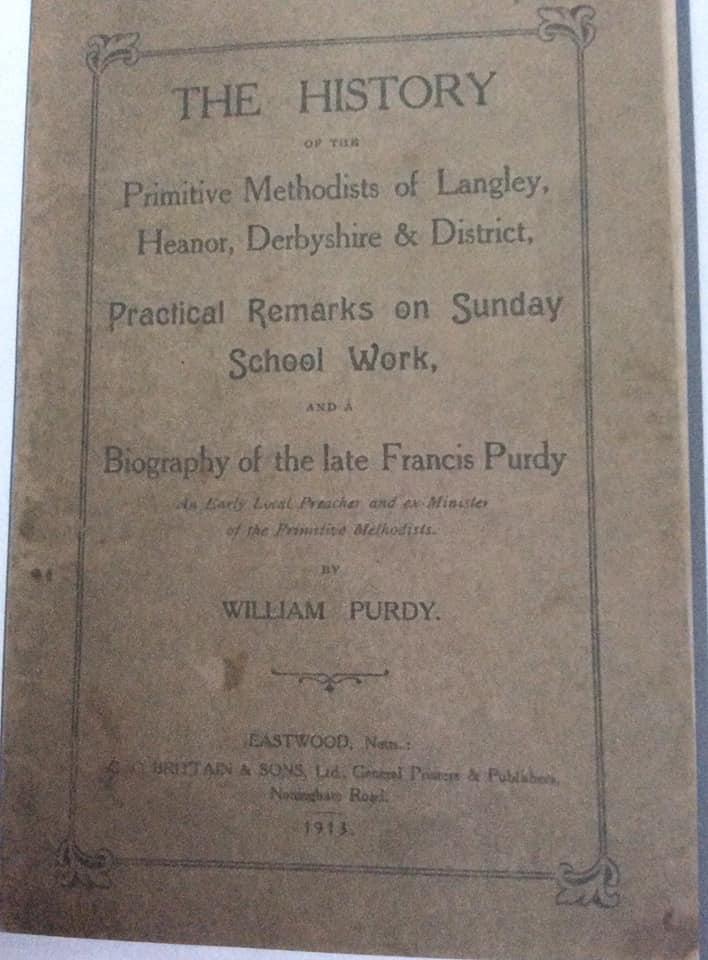
Francis Purdy:
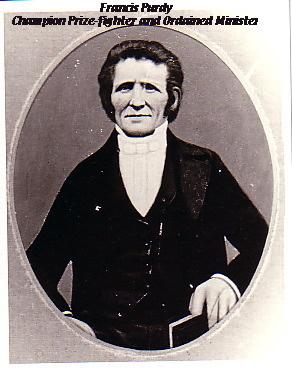
The following can be found online from various sources but I am unable to find the original source to credit with this information:
“In spite of having pious parents, Francis was a great prize-fighter and owner of champion dogs. He was known as the Beggarlee Bulldog, and fought many pitched battles. It was in 1823 that he fought on Nottingham Forest for the championship of three counties. After the fight going eleven rounds, which continued one hour and twenty minutes, he was declared victorious.”
The Primitive Methodists under the Rev Richard Whitechurch began a regular mission in Beggarlee. The locals tried to dismiss the Methodist “Ranters” by the use of intimidating tactics. Francis was prepared to release his fighting dogs during their prayer meeting, but became so interested in their faith that he instead joined them. The Methodist Church wrote: ”A strong feeling came over him, while his mates incited him to slip his dogs from the leads. He refused, and decided to return home. After concealing himself in a dyke, to listen to the Missioners on the following Sunday, he stole into the house of a Mrs Church, where a service was being held. Shortly after this, a society was formed with Francis Purdy as leader, and he was also the superintendent of the first Sunday School. After a short spell as local preacher at Beauvale, Tag Hill, Awsworth, Kimberly, Brinsley, etc., Mr Francis Purdy was ordained a minister by the Rev. Thomas King, of Nottingham, on the 17th December, 1827.”
December 13, 2021 at 12:33 pm #6225In reply to: The Elusive Samuel Housley and Other Family Stories
William Marshall’s Parents
William Marshall 1876-1968, my great grandfather, married Mary Ann Gilman Purdy in Buxton. We assumed that both their families came from Buxton, but this was not the case. The Marshall’s came from Elton, near Matlock; the Purdy’s from Eastwood, Nottinghamshire.
William Marshall, seated in centre, with colleagues from the insurance company:
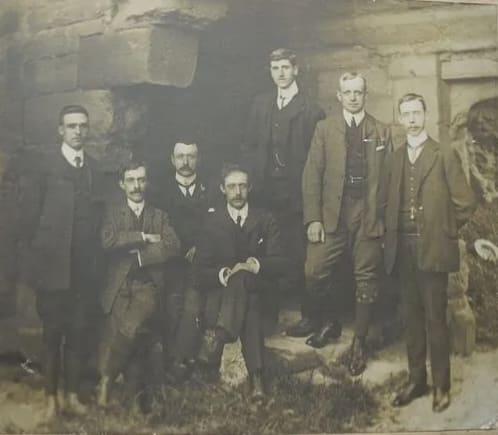
William and all his siblings were born in Fairfield in Buxton. But both Emma Featherstone 1847-1928, his mother, and John Marshall 1842-1930, his father, came from rural Derbyshire. Emma from Ashbourne (or Biggin, Newhaven, or Hartington, depending on what she chose to put on the census, which are all tiny rural places in the same area).
Emma and John Marshall in the middle, photo says “William Marshall’s parents” on the back:
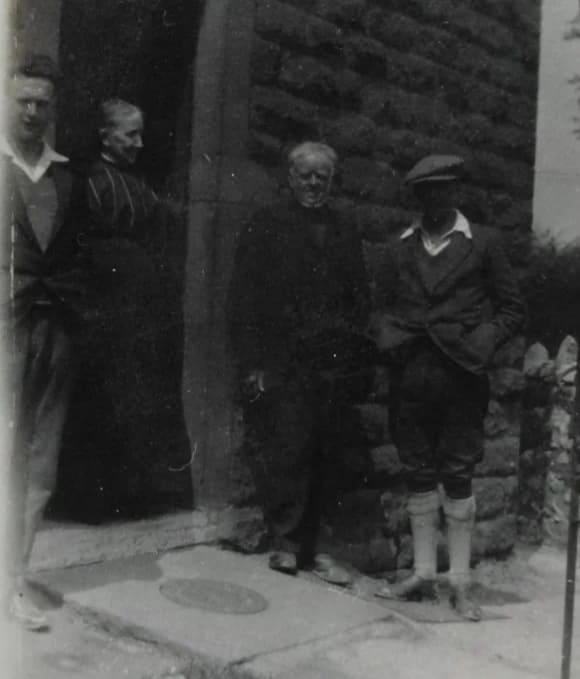
John Marshall was a carter, later a coal carter, and was born in Elton, Derbyshire. Elton is a rural village near to Matlock. He was unable to write (at least at the time of his wedding) but Emma signed her own name.
In 1851 Emma is 3 or 4 years old living with family at the Jug and Glass Inn, Hartington. In 1861 Emma was a 14 year old servant at a 112 acre farm, Heathcote, but her parents were still living at the Jug and Glass. Emma Featherstone’s parents both died when she was 18, in 1865.
In 1871 she was a servant at Old House Farm, Nether Hartington Quarter, Ashborne.On the census, a female apprentice was listed as a servant, a boy as an apprentice. It seems to have been quite normal, at least that’s what I’ve found so far, for all teenagers to go and live in another household to learn a trade, to be independent from the parents, and so doesn’t necessarily mean a servant as we would think of it. Often they stayed with family friends, and usually married in their early twenties and had their own household ~ often with a “servant” or teenager from someone else’s family.
The only marriage I could find for Emma and John was in Manchester in 1873, which didn’t make much sense. If Emma was single on the 1871 census, and her first child James was born in 1873, her marriage had to be between those dates. But the marriage register in Manchester appears to be correct, John was a carter, Emma’s father was Francis Featherstone. But why Manchester?

I noticed that the witnesses to the marriage were Francis and Elizabeth Featherstone. He father was Francis, but who was Elizabeth? Emma’s mother was Sarah. Then I found that Emma’s brother Francis married Elizabeth, and they lived in Manchester on the 1871 census. Henry Street, Ardwick. Emma and John’s address on the marriage register is Emily Street, Ardwick. Both of them at the same address.
The marriage was in February 1873, and James, the first child was born in July, 1873, in Buxton.
It would seem that Emma and John had to get married, hence the move to Manchester where her brother was, and then quickly moved to Buxton for the birth of the child. It was far from uncommon, I’ve found while making notes of dates in registers, for a first child to be born six or 7 months after the wedding.
Emma died in 1928 at the age of 80, two years before her husband John. She left him a little money in her will! This seems unusual so perhaps she had her own money, possibly from the death of her parents before she married, and perhaps from the sale of the Jug and Glass.
I found a photo of the Jug and Glass online. It looks just like the pub I’d seen in my family history meditations on a number of occasions:
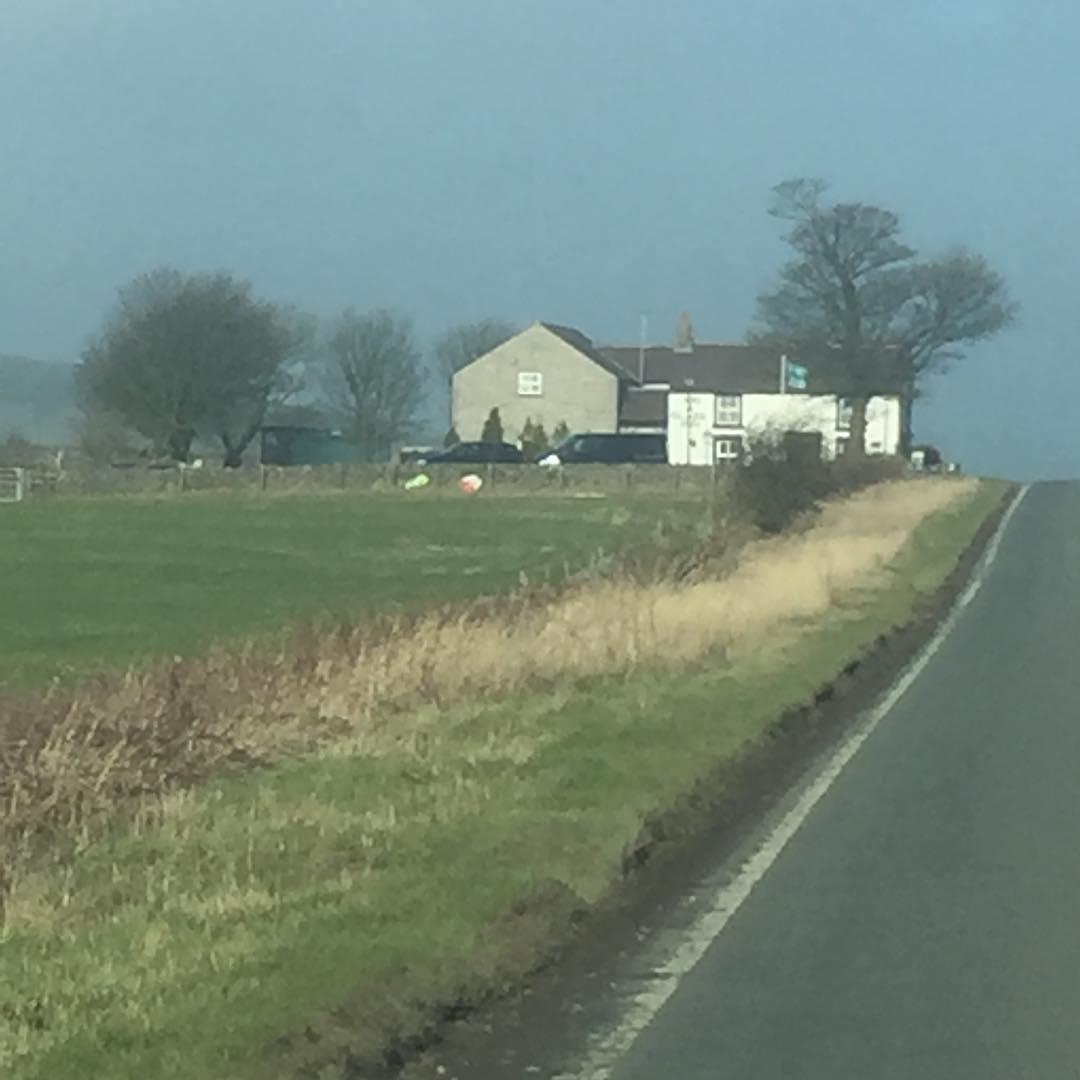 September 20, 2021 at 5:51 pm #6214
September 20, 2021 at 5:51 pm #6214In reply to: The Precious Life and Rambles of Liz Tattler
When Finnley got out of her full body bathing suit, Liz gaped at her.
“It appears your suit wasn’t that waterproof after all. You should have kept the receipt. Now you can’t ask for a refund.”
Finnley rolled her eyes while sending daggers. Liz caught them in extremis with her pen and put them down in writing at the end of her pink notebook for later reference. She thought maybe they could be an appropriate prop for the family betrayal she planned to write about in her next chapter. Daggers between the shoulder blades were always a nice effect.
“I don’t need a receipt, I ordered them online.”
“What do you mean? What does she mean Gordon? She looks so mad, she won’t answer me… and stop eating those bloody nuts. That’s not good for your cholesterol.”
“Actually that’s the reverse,” said Gordon.
“Stop eating them! I find the crunching noise and the movement of your tongue on your teeth disturbing.”
“She means she kept the email with the e-receipt. Knowing her she’s probably kept it in the trash for safekeeping.”
Finnley threw another pair of daggers.
“Ouch!” Gordon said.
“You deserved that,” said Liz. “You were mean. Now I need to talk to Godfrey. He’ll know the answers, he always know. Where is he?”
“Just behind you. I’m always behind you.”
“Don’t say that, it can be misinterpreted. Anyway, can you answer the question?”
“She kept the email with the e-receipt in her trash can. You know, it’s an internet thing. Like the writing workshop you asked me to help you organise.”
“Oh! I totally forgot about that.”
“You have 57 inscriptions. The chat session starts in 5, no 7 minutes. Should I be worried?”
“No you shouldn’t. Just do the typing for me please. You type faster than me, I’m still doing it with one finger, well two actually, now I can use both hands.”
“Okay, you’ll speak to me as if you were speaking to them and I shall write down your words faithfully.”
“You can do the speaking too, dear. Godfrey, you’ve known me for so long, you know better than me what I’m going to say.”
Liz looked at Finnley’s blue hands and turned back to Godfrey. “Oh, and before you do that, prepare some cucumbers slice, I need a power nap.”
April 18, 2020 at 10:23 am #6026In reply to: The Whale’s Diaries Collection
Dear Jorid Whale,
My hands are shaking while I type this on the keyboard.
I’m not sure which of last night’s dreams is the bizarrest. Bizarre in a fantastic way, although for certain people it might be called grotesque. I’m certain it has something to do with that book I ordered online last week. I don’t usually read books and certainly not like this one. But the confinement, it makes you consider making things out of your ordinary.
It’s called The Enchanted Forest of Changes, by a Chinese artist Níngméng (柠檬). They say his artist name means lemon, but that some of his friends call him Níng mèng 凝梦 (curdle dreams), which to my ears sound exactly the same except a little bit angrier. I found out about him on a forum about creepy dolls abandoned in forests all around the world. Yeah exactly, the confinement effect again. Apparently it started with a few dolls in a forest in Michigan, and then suddenly people started to find them everywhere. I wonder if some people are really into the confinement thing or if it’s just me using that as a reason to stay home.
Anyway, someone on that forum posted one of the picture of that book and it caught my eye. So much so that I dreamt of it the following night. So I bought the book and it’s mostly ink drawings, but they seem to speak directly to some part of you that you were not even aware you had. I almost hear whispers when I look at the drawings. And then I have those dreams.
Last night I dreamt of a cat that had been raised as a boy. He even had the shape of one, but shorter maybe. He had learned to talk and use his paws as hands, his claws had grown into fingers, had lost most of his fur and he was wearing clothes. If I was amazed by such a feat, it kinda seemed normal for the people I met in that dream. It just took a lot of efforts, love and dedication to raise this kind of children.
And Whale, I feel tingling in my arms. This morning you showed me the picture of a kitten! That’s not a mere coincidence. I’m feeling so excited, my hands are too slow to type what I want to write. I fear I’m going to forget an important detail.
About the second dream. The world was in shock, there was this giant… thing that looked like a pistil and that had grown during the night in some arid area. It was taller than the tallest human made tower. Its extremity was cone shaped, and I confess that the whole thing looked like some kind of dick to me.
Plants and trees had followed in the following days as if the pistil had changed the climatic conditions (autocorrect wanted to write climactic, is that you playing around?).
The pistil was protected by some kind of field and it couldn’t be approached by everyone. Governments had tried, pharmaceutical companies had tried. People who wanted to make gold out of it, they were all rejected. But for some reason some people could approach. Anyone, not just the pure of hearts or the noble ones. Actually a whole bunch of weirdoes started to take their chances. Some were allowed in and some where not. Nobody knew what was the deciding factor.
A friend of mine that I have not seen in years during my waking life, she came back and asked me to come with her. So we went and were allowed in. My recall of the events after that is fuzzy. But I get the strange impression that I will spend more time in there later on.
[Edited in the afternoon]
I don’t believe it! It’s on the news everywhere. It has even replaced the news about the virus and the confinement.
Giant pistils have appeared around the world, but it seems only people who had been infected can see them.
Crazy rumours run on the internet. Giant mass hallucination caused by the virus. Some people say it’s alien technology, spores engineered to control our brains.
There is one not so far from where I live. Should I wait for Kady to call me?
April 7, 2020 at 2:04 pm #5964In reply to: Newsreel from the Rim of the Realm
They walked through a labyrinth of tunnels which seemed to have been carved into a rocky mountain. The clicks and clacks of their high heels echoed in the cold silence meeting all of Sophie’s questions, leaving her wondering where they could be. Tightly held by her rompers she felt her fat mass wobbling like jelly around her skeleton. It didn’t help clear her mind which was still confused by the environment and the apparent memory loss concerning how she arrived there.
Sophie couldn’t tell how many turns they took before Barbara put her six fingers hand on a flat rock at shoulders height. The rock around the hand turned green and glowed for two seconds; then a big chunk of rock slid to the side revealing a well designed modern style room.
“Doctor, Sophie is here,” said Barbara when they entered.
A little man was working at his desk. At least Sophie assumed it was his desk and that he was working. He was wearing a Hawaiian shirt and bermudas. The computer screen he was looking at projected a greenish tint onto his face, and it made him look just like the green man icon. Sophie cackled, a little at first.
The Doctor’s hand tensed on the mouse and his eyebrows gathered like angry caterpillars ready to fight. He must have made a wrong move because a cascade of sound ending in a flop indicated he just died a death, most certainly on one of those facegoat addictive games.
That certainly didn’t help muffle Sophie’s cackle until she felt Barbara’s six fingers seizing her shoulders as if for a Vulcan nerve pinch. Sophie expected to lose consciousness, but the hand was mostly warm, except for that extra finger which was cold and buzzing. The contact of the hand upon the latex gave off little squeaky sounds that made Sophie feel uncomfortable. She swallowed her anxiety and wished for the woman to remove her hand. But as she had noticed more than once, wishes could take time and twists before they could be fulfilled.
“Why do you have to ruin everything every time?” asked the Doctor. His face was now red and distorted.
“Every time?” said Sophie confused.
“Yes! You took your sleeper agent role too seriously. We couldn’t get any valuable intel and the whole doll operation was a fiasco. We almost lost the magpies. And now, your taste for uncharted drugs, which as a parenthesis I confess I admire your dedication to explore unknown territories for science… Anyway, you were all day locked up into your boudoir trying to contact me while I just needed you to look at computer screens and attend to meetings.”
Sophie was too shocked to believe it. How could the man be so misinformed. She never liked computers and meetings, except maybe while looking online for conspiracy theories and aliens and going to comiccons. But…
“Now you’re so addict to the drugs that you’re useless until you follow our rehab program.”
“A rehab program?” asked Sophie, her voice shaking. “But…” That certainly was the spookiest thing she had heard since she had arrived to this place, and this made her speechless, but certainly not optionless. Without thinking she tried a move she had seen in movies. She turned and threw her mass into Barbara. The two women fell on the cold floor. Sophie heard a crack before she felt the pain in her right arm. She thought she ought to have persevered in her combat training course after the first week. But life is never perfect.
“Suffice!” said the Doctor from above. “You’ll like it with the other guests, you’ll see. All you have to do is follow the protocol we’ll give you each day and read the documentation that Barbara will give you.”
Sophie tried a witty answer but the pain was too much and it ended in a desperate moan.
February 13, 2020 at 1:44 am #5790In reply to: Tart Wreck Repackage
“Rosamund’s Aunt Joanie is a vegan anti-vaxxer,” said Tara, frowning at the large piece of pizza being shovelled into Rosamund’s mouth.
“That’s right,” Rosamund nodded enthusiastically. “Anti-vegan vaxxer and she don’t eat nothing with no eyes either. She drives Mum bloody mental going on about how the animals have got souls while Mum’s trying to enjoy a nice baccy fry up. Mum calls her Aunt Moanie.”
Tara shuddered and turned her attention firmly to the laptop. “This is very strange,” she muttered. “Star, what exactly do we know about Mr Vince French?”
Star smirked. “Other than his obvious attributes?”
“Which are?” Tara’s voice was sharp and Star sighed. Tara could be a mardy cow sometimes.
“You mean the fella with the voice like a bloody angel?” asked Rosamund, spitting an olive onto Tara’s sleeve. Tara swore under her breath as the olive bounced to the floor. Fortunately there was no mark; it was a new blouse and had cost Tara an arm and a leg. Worth the investment, she had reasoned at the time. One must look the part. And clearly, her Moulin Rouge ensemble wasn’t a good look for a Professional Investigator, even with fishnets and a feather boa.
“He cancelled his appointment but he paid the, quite frankly exorbitant, deposit we asked for,” said Star. “He’s going to email us the rest of the details. Do we need to know more that that?”
“Well, I’ve been doing a search and there is nothing anywhere online about him, or his world famous melodious voice. I suggest we pay this Mr French a visit.”
“Oh bloody awesome!” Rosamund leapt to her feet and pizza boxes went flying. “Oops, sorry about that. I’ll clean it soon as we get back.”
February 7, 2020 at 7:47 am #5738In reply to: Tart Wreck Repackage
Star was perusing the messages in the cults online forum, having joined the private group under the name of Writhe Mamble. It was time consuming, and a task that Star hoped to delegate to Rosamund. But first she needed to familiarize herself with the angle of the dogma and the leanings of the various members, as well as the physical data: photos, location, age and other affiliations.
Star had to keep reminding herself that it was of no importance whether or not she agreed with some of the messages, or strongly disagreed. Never the less she found herself liking some of the members as she read more, as well as wanting to slap others.
She made a note: remain neutral and remember why you are there. Star couldn’t help wondering uneasily how Rosamund would be at remaining neutral.
Maybe easier than you can manage it, said Granola, the voice appearing as if from nowhere.
“Easier than I can manage what?” asked Rosamund, crashing into the room with an armful of pizza boxes. Without pausing for an answer, she continued, “Mum’s having a fit, I might have to have tomorrow off work to go and calm her down. She’s talking about locking the house up and moving in with me. I can’t have that, I got a bit of business going on at the flat, you know what I mean?” Rosumund wiped the tomato sauce off her mouth with her sleeve.
“But why is she threatening to do that?” asked Star, who wasn’t the least bit interested.
“Her sister’s on her way over.” Misinterpreting Star’s raised eyebrow, Rosamund added. “Oh yes. THAT sister.”
June 27, 2019 at 1:19 pm #4613In reply to: Pop﹡in People Tribulations
For a moment, Granola felt in a dream world. It wasn’t the first time it happened, so she relaxed, and let her consciousness focus despite the distraction from the shimmering and vibrating around the objects and people.
She was in another mental space, but this one was more solid, not just a diversion born from a single thought or a single mind. It was built in layers of cooperation, alignment, and pyramid energy. A shared vision, although at times, a confused one.
The first time she’d visited, she thought it was a fun fantasy, like a dream, quickly enjoyed and discarded. But then she would come back at times, and the fantasy world continued to expand and feel lively.
It slowly dawned on her that this was a projection of an old project of her friends. The more striking was how people in the place looked a bit like Maeve’s dolls, but she could see the other’s imprints —Shaw-Paul’s, Lucinda’s and Jerk’s—, subtle energy currents driving the characters and animating everything.
It felt like a primordial fount of creativity, and she basked in the glorious feeling of it.
Once, she got trapped long enough to start exploring the “place” in and out, and it all became curiouser when she found out that the places and the stories they told were all connected through a central underground stream.
Granola had been an artist most of her life, so she understood how creativity worked. Before she died, she had been intrigued the first time her online friends had mentioned this collaboration game, creating that mindspace filled with their barmy stories. She didn’t believe such pure mental creation could be called real at all.
Maybe that was the kind of comments that let her friends forget it.
If only she could tell them now!“You could, if you’d hone your pop-in skills, dear”, a random character suddenly turned to her and spoke in the voice of Ailill, her blue mentor.
“But how can you see me? I’ve tried and the characters of these stories don’t ever see me!”
“That’s what popping in is all about, justly so!” Ailill had this way of making her mind race for a spin.
“Now, will you stop hijacking this person, and tell me why you’re interrupting my present mission?” Granola turned burgundy red, increased her typeface a few notches, and pushed her ghost leg vigorously at the story character.
“Oh, you are right about that. It is a mission.” he smiled, “I think you’d want to go find certain characters, or avatars. Your friends personae are always shifting into new characters, but they hide themselves and don’t progress. Actually, some of them are trapped in loops, and those loops are not happily ever after. You can help free them, so they can recover their trapped creativity.”
“Well, that doesn’t sound like an impossibly vague mission at all!”She was about to continue ranting, but the pop-in effect was gone, and the character was back to his routine, unperturbed by her ghostly agitation.
April 18, 2018 at 12:34 pm #4453In reply to: The Precious Life and Rambles of Liz Tattler
Liz had an idea, and was glad that the others were all out on a day trip to the museum so that she could think about it without interruptions. It had occurred to her that there was probably a theme right under their noses regarding the multitudes of non endings in the stories. Where exactly had they all ended without actually ending?
Sure enough, the first one she looked at seemed promising with the mention of sheets:
“Yurick woke up from another spell of dreams. The patterns of the bedsheets where as though his newly inserted tile was creating a strong combination with other tiles.
In his puzzlement, he forgot to take a physical dream snapshot…”Liz had had a personal breakthrough with bedsheets recently, and was pleased with this encouraging start.
When Liz looked at the next non ending of a story, she wondered if this would prove to be a theme: the characters themselves had gone missing.
“I haven’t heard a word from Lavender for the longest time, Lilac was wondering, When was the last time? Lavender, where ARE you?”
Liz had a slight jolt when she saw the non ending of the story after that, worried that she would find a trend of herself being the last writer to comment. What would that mean, she wondered?
“Minky was looking smug. “Enjoying the ride?”
Ending with a question? Well, that was something to think about. Liz was relived to find she wasn’t the last writer to write in the next story:
“For once, Arona was completely unconcerned about continuity.
“I wonder if we could harness the power of the wind to create a flash mob to amuse and entertain me?” she suggested.
Vincentius pondered for a moment “I did once employ a hamster to power a night light, so I don’t see why not.”Smiling at the continuity remark, Liz pondered the nature of the message in this one. Anything can be created to amuse… can it be that easy?
Another nasty jolt as Liz read the last entry in the following story, considering the irritating few days she had just had with the online payment company:
“She clicked with her dysfunctionning mouse and invalidated the transaction again.”
Well, Liz said to herself, I certainly hope that little chuckle will have helped change the online transaction situation going on here presently!
July 11, 2016 at 10:19 am #4112In reply to: Mandala of Ascensions
“And what does it mean?” James asked Gelly.
“2. The Receptive, ach, es means quietness is gut, ja. Und es ist a good time to ask yourself ‘Am I sincerely pursuing the gut für its own sake, or do Ich have ein hidden agenda?’.”Gelly was drawing the I-Ching to help James about his question. He still had doubts about his decision to enroll.
“Did you have any chance to reach Floverley?”
“Ach, She is tricky Master, very subtle energy, difficult to draw in, but yes, she has manifested herself a few times. She seems to like my owl sehr much.”
“I would be interested in connecting with Her, can you setup an appointment?”
“Oh, that would be interesting, why not, let me put you in… what about… next week? same time?”
“That would be great thanks.”
Edward removed the VR helmet from his head, and looked at Florence’s pod on the surveillance cam with a forlorn look on his face.
He was well aware that, like many “normal” people in the Great Simulation, Gelly was just another program developed and maintained by the central system, REYE itself. But sometimes REYE’s programs managed to get buggy, glitchy or a bit on the fringe of the acceptable parameters. Gelly was one of those programs, not completely autonomous, but sort of aware of the beyond of her parameters. In any case, Ascended Master would look for no lesser caliber of persons to enlighten. So, she was quite a potential lure to Floverley, or even Dispersee.
James was Edward’s completely virtual avatar, and James’ online meetings with Gelly could fit undetected within the acceptable boundaries of the whole program and go beyond the radar of the ever-looking REYE.
Edward couldn’t wait to meet with Flo next week.
July 11, 2016 at 9:57 am #4111In reply to: Mandala of Ascensions
It has been a few days he had felt this inexplicable urge to do something about the dullness of his everyday routine.
Overall, Edward had never complained about his simple life, and the System’s technical upgrades did keep him rather busy fixing things when boredom threatened to settle in.
Usually, browsing through social media, enjoying a few cute fluffy bunnies videos (all very safe for work, no need to worry about him) was all that he needed to fill the gaps of the long shift hours.
Of course, the largest part of his days was spent monitoring the Program, and the pods. He had developed quite surreptitiously a basic visual neuronal interface that let him connect with the Virtual Reality of the pod occupants, and somehow share the progress of their Enlightenment Mission.
For a while he had even created an avatar for himself. In the Great Simulation, he would then try to have some fun with the Ascended Masters, see what they would enlighten him about.
It was all quite ironic, considering, they were considering themselves free and evolved, where in truth they were the prisoners of their own bodies in the pods, hooked to the virtual reality REYE program.
But they were accurate in a way, that he was also trapped and a prisoner of his existence within the program.In between cats and bunnies, a link attracted him. “Rich Sacks’ Online Master Program of Enlightenment”. The more he scrolled down, the more alumnis raved and extolled the Program. What was for him to lose, the first course was free.
On a whim, he decided to enroll.May 15, 2016 at 9:18 pm #4031In reply to: Newsreel from the Rim of the Realm
Thither Perambulations
“There is a good deal of Spain that has not been perambulated. I would have you go thither.”
Hilda Astoria’s weekly travel column
wanted: secretary and cleaner.
apply within
September 29, 2015 at 5:50 am #3791In reply to: The Hosts of Mars
Before he retired and made cave carving his hobby, Pádraig was an IT engineer. That was a few years back, and not long after, most of them became redundant with the rise of new generations of NI (near-intelligent) phones and computers. He’d happily taken an early retirement, so that he could enjoy a simple life and get to reacquaint with his daughter. He’d succeeded at least on the first objective.
It was twilight when he’d left his cave, and looking at the horizon, he’d noticed strange shimmering, and a lone bird of prey circling the area in the direction of the restricted area of the desert.
It’d given him an idea.
He still had the old drone in his garage, from the time when they were all the furor. You could buy them on online stores very easily back then, even print them in your house. But then, some do-gooders became concerned, about privacy, security or all that bullshit, and they were banned. Actually, the only ones still flying where from the army, and they would tear down any unidentified hobbyist’s drone, and likely give them some jail time if they had the chance.It was exciting to do something on the fringe of what was authorized. Pádraig couldn’t wait to see if he could make his old drone fly over the area, check what happened there.
He was a bit lost in his thoughts when the dog’s barking made him notice the white car parked in front of his aluminium trailer, which had triggered all his spotlights.
He had a moment of panic before he realized that the car wasn’t from the men in black or aliens, but worse. It was Imelda, his do-gooder of a daughter.December 2, 2014 at 6:23 am #3599In reply to: The Chronicles of the Flying Fish Inn
I woke up this morning with an idea in my head, and I don’t know if I was dreaming about it or if it just popped in, in the brief moments between sleep and waking. I made a connection with the topic I was doing an anthropology report on, and something I’d forgotten. No, not forgotten, it wouldn’t be true to say I’d forgotten it as it was always there at the back of my mind niggling at me that there was more to it somehow, but I hadn’t made the connection so obviously with the current project.
My research was about disconnection, and the separation agenda of the American channeling dream. At first I felt driven to explore particular areas and then piece by piece the puzzle that had nagged at me for years ~ I say years, it felt like years, but maybe it wasn’t so long ~ started to fall into place.
At first when I woke up the idea of censorship was in my head and the idea to start a petition and public awareness campaign about certain channeled texts that were withheld from public viewing, despite repeated requests for them to be public along with all the other texts. But then it occurred to me that censorship and omission wasn’t always deliberate. I mean, not a conscious choice to keep information secret, but something else. Almost like a case of some information not being seen clearly through the filters, yet for some reason dismissed as not fitting, and pushed away, almost unconsciously, and suppressed.
The text was about disconnect mainly, and there was some stuff about Nazi’s although the part about animals was the part that had stuck in my head, probably because I felt more connected to animals than Nazi’s. There were more animals growing up here than Nazi’s after all, Nazi’s was only something I’d heard about. But then it occurred to me that I’d been hearing more and more about Neo Nazi’s, in Europe mainly, forming groups and having protests. So that got me wondering about that too.
Anyway, the disconnect part: it was the reaction on the American channeling forums to the Ferguson riots that started me on this project, and Aunt Idle was full of encouragement when I started to explain to her what I was noticing. She said she had noticed similar things in her remote viewing circle online. Everyone seems to think Aunt Idle is losing her marbles, but don’t you believe it. She seems vacant and scattered but that’s only because her mind is occupied elsewhere.
The gist of this suppressed text was extreme separation, but it was the part about using words to seem enlightened to hide extreme disconnect that seemed to fit my project.
I did have to chuckle though, I wondered if I was being a racist by calling Americans disconnected as if it was a racial characteristic. More of a cultural thing, I suppose, can one be called a culturalist as if it’s a bad thing? I don’t see how you can study anthropology without a certain degree of separating into cultural groups though, even if it is shift anthropology. I’ll think about that a bit more later.
-
AuthorSearch Results